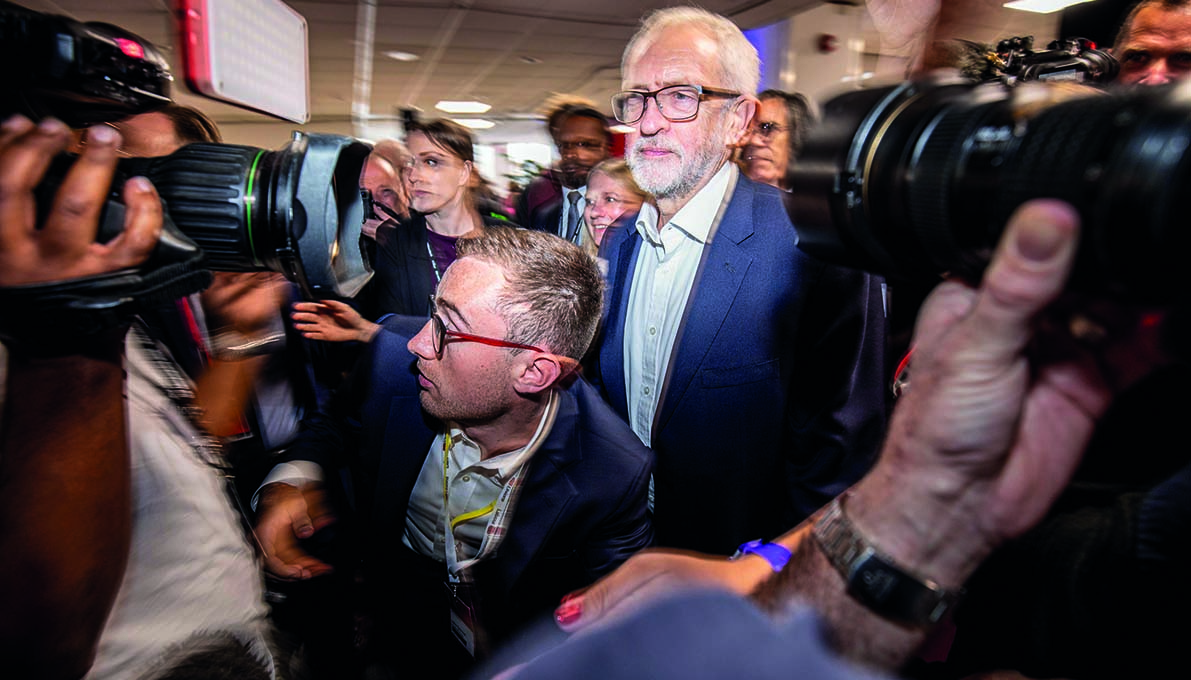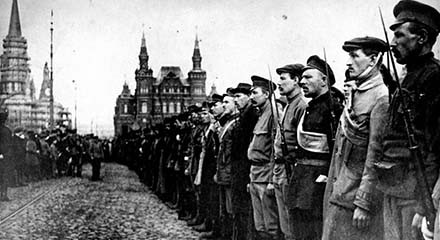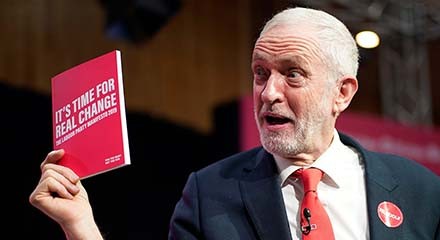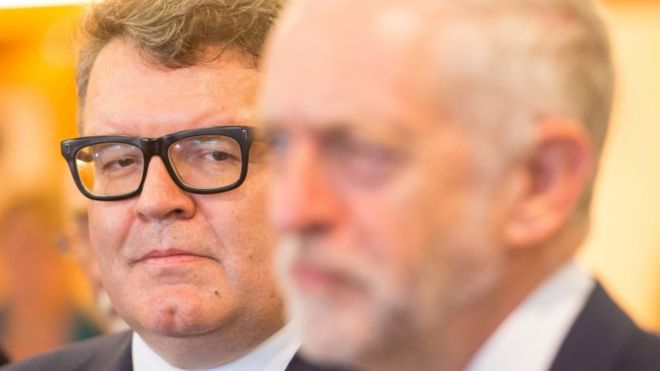James Marshall critiques the ‘defence and security’ section of the 2019 manifestoApart from a few tweaks here and there, the ‘official’ Labour approach to what is euphemistically called ‘defence and security’ is an unmistakable continuation of the Tories’. True, the 2019 manifesto, It’s time for real change, complains about the reduction in “trained army personnel” (ie, professional soldiers) from 102,000 to just over 74,000, the below-inflation pay rises and how members of the armed forces and their families are obliged to live in substandard accommodation.Similar comments have, though, come from the mouth of General Lord Richard Dannatt. The former head of the army decries the “smallest navy, army and air force we have ever had”. What about pay and conditions? A few years ago we find him saying that “pay was the most important issue facing the armed forces” and that the “appalling” accommodation has to be improved.
Needless to say, there is nothing remotely radical about Richard Dannatt, a GCB, a CBE, a MC, a DL as well as being a Lord. Though nowadays sitting as a cross bencher, revealingly, breaking normal army conventions, he served as David Cameron’s advisor on military affairs when he was leader of the Tory opposition.
As for socialists, while we should criticise low pay and bad accommodation in the armed forces, a shrinking standing army is surely another matter entirely. In principle, we cannot object.
It’s time for real change condemns the fact that Boris Johnson’s government “refuses to publish the report into possible foreign interference by Russia in UK democracy”. Nevertheless, Dominic Grieve, Jo Swinson, Financial Times Europe editor Tony Barber, even Hillary Clinton, have said the exact same thing. So, once again, nothing controversial in bourgeois terms.
Police
Perhaps the most contentious proposal contained in It’s time for real change – well, at least when it comes to ‘defence and security’ – is the suitably vague promise to “consult on creating a representative body for the armed forces, akin to the Police Federation”.
Trailed earlier this year, inevitably the proposition resulted in lathering condemnations: Corbyn is a threat to army discipline, a friend of terrorists, a hard-line Marxist, etc. Needless to say, though, there is nothing remotely Marxist about the proposal. The Police Federation model is a giveaway.
Established by the 1919 Police Act, it replaced the National Union of Police and Prison Officers, which – and this is crucial – in August 1918 and June 1919 organised nationwide police strikes. The government put infantry and tanks onto the streets. Yet a “combination” of economic concessions, repression, political manoeuvring, union blunders, police divisions and the failure of organised labour to support the police “ensured the failure of the 1919 strike”.
Liberal Party prime minister David Lloyd George saw the defeat of the 1919 strike as a decisive “turning-point in the labour movement, deflecting it from Bolshevist and direct-actionist courses to legitimate trade unionism once again”. His Liberal-Conservative coalition proscribed NUPPO and made sure that strikers were summarily fired and then blacklisted – a cruel act of revenge, which faced only “half-hearted” opposition from the Labour Party in parliament.
Unlike NUPPO, the Police Federation is barred by statute from affiliating to the TUC. No less vital, it represents all ranks, from ordinary constables to chief inspectors, and is legally forbidden to take strike action. With good reason, the Police Federation has been described as “amounting to a sort of company union” (Owen Jones – writing when he was a leftwinger).
Nato
Showing that a Jeremy Corbyn-led Labour government would act fully within, not against, the US-dominated world order, there is the pledge to “maintain our commitment to Nato and our close relationship with our European partners”.
Nato is an unmistakable product of the cold war. A US-sponsored grand alliance designed to anathematise the Soviet Union, hegemonise the fading British and French imperiums, incorporate West Germany and serve as a bulwark against mass communist parties in Italy, France and Greece. US bases were established throughout western Europe. Simultaneously, counterrevolutionary institutions were embedded and the social democratic settlement promoted.
Under the presidency of Ronald Reagan, US strategy underwent a significant change. Out went social democracy and containment; in came neoliberalism and “rollback”. Hence the feeble complaint that Nato membership locks Britain into “American superpower manoeuvres” and makes it “impossible to pursue a principled international course” (Peter Hain – writing when he was a leftwinger).
Following the collapse of bureaucratic socialism in eastern Europe and the Soviet Union – and with it the US victory in the cold war – “was the obvious time for Nato to have been disbanded” (Jeremy Corbyn, 2012). Instead, Nato expanded to Russia’s very borders: a violation of the “host of assurances” given to Mikhail Gorbachev in 1990 that Nato would not go beyond what had been the German Democratic Republic. So no protective buffer zone. And eyes are set on further eastern expansion. Ukraine and Georgia have been in Nato “membership action plan” (MAP) negotiations. A recipe for war.
The Labour leadership’s Nato pledge is clearly designed to appease. Donald Trump, the largely undiminished Labour right, big business, the City, the capitalist media, the generals, need not worry about the next Labour government … “Jeremy has been on a journey” (Emily Thornberry, 2018).
Then there is the commitment to spend at least 2% of GDP on “defence”. This was demanded by Barack Obama back in September 2014; he wanted all Nato members to take a greater share of the “burden”. David Cameron’s government eagerly agreed. In his financial statement of July 8 2015, George Osborne promised to meet the 2% target “not just this year but every year of this decade”. So, when it comes to ‘defence and security’, what It’s time for real change says comes straight from the Tory songbook.
To leave not a shadow of doubt about the class nature of the “next Labour government”, we read this truly disgusting passage: “Labour supports the renewal of the Trident nuclear deterrent.” Naturally, this goes hand-in-hand with pieties about global peace, the UN, “multilateral efforts”, the Non-Proliferation Treaty and creating a “nuclear-free world”. But the same can be said of every modern UK government. Against left demands to unilaterally abandon nuclear weapons – Michael Foot, Tony Benn, Jeremy Corbyn – Tory and Labour prime ministers alike claimed that they were multilaterally working towards a ‘nuclear-free world’.
Suffice to say, each of the four Dreadnought submarines being built under the Trident renewal programme (total cost – some £40 billion) will carry 12 Trident II D-5 missiles. Each missile has eight independently targeted warheads, each with an explosive power of some 100-475 kilotons – or, put another way, more than five to 25 times the A-bomb that levelled Hiroshima in August 1945. Without a doubt, Trident is an “indiscriminate weapon of mass destruction” (Jeremy Corbyn, July 2016).
There are those who somehow still manage to pass themselves off as leftwing, who give this dismal narrative a radical, anti-capitalist spin. Speaking at one of Momentum’s World Transformed events, Paul Mason outlined his case for a “battle of rational ideas”. Basically, what his rationality boils down to is Labour striving to prove its “economic competence” and promising that there will be an “essential continuity, that there’s going to be an army, nuclear weapons and a police force”. In other words, a Labour government which will seek to manage capitalism better than the Tories and do nothing to take the “toys” (Paul Mason’s word) from the top brass boys. Yes, he calls the weapons that killed between 90,000 and 146,000 people in Hiroshima and between 39,000 and 80,000 people in Nagasaki “toys”. Obnoxious. So, at least when it comes to ‘defence and security’, it is clear that the advice offered by this repentant Trotskyite has been accepted.
It is, of course, completely useless denouncing It’s time for real change from the sidelines – the position of dilettantes, dogmatists and brittle sects. No, Marxists must learn how to lead masses of people, even if at the moment most possess only an elementary level of class-consciousness.
Not to actively take part in the “real workers’ movement”, not to even to try to push the struggle being fought out in the Labour Party to the point where Marxists transform it into a united front of a special kind, and thereby secure a commanding control over CLPs, the NEC, the PLP, etc, is not merely foolish: it is criminally irresponsible. The immediate task of any worthwhile leftwing group or trend is to engage with the Labour Party’s rank and file at the closest possible quarters. Marxists must win the real “battle of rational ideas”. In the context of this article, we seek to convince this hugely expanded mass that we not only need a genuine socialist economic programme. We need a genuine socialist military programme too.
War
Despite Donald Trump’s sanctions and bellicose threats, China’s imperial Belt and Road initiative, the defensive expansionism of Russia and Emmanuel Macron’s call for a common European arms budget and common armed forces, there is no immediate prospect of an all-out World War III. With the certainty of mutually assured destruction (MAD), who would fight whom and why?
Nevertheless, there is the obvious danger of a regional conflict sucking in rival big powers with all manner of unpredictable consequences: Iran, Venezuela, Israel-Palestine, North Korea, Ukraine, Syria, Taiwan and the South China Sea all spring to mind. A direct clash between the US and Russia or China could quite conceivably rapidly escalate. Even a limited nuclear exchange would exact an almost unimaginable human toll.
However, what distinguishes Marxists from others on the left who oppose the danger of war is that we emphatically reject all varieties of pacifism. And, when it comes to the left, there are all manner of daft nostrums on offer. A few representative samples.
The Labour Representation Committee touchingly suggests appointing a “UK minister for peace”, and a Labour government which will “progressively withdraw the UK from the international arms trade”. Banal gloop, which obviously has nothing in common with socialism.
Will gushing praise for the UK’s “worldleading” defence industry and the promise to “continue to work with manufacturers, unions and export partners” cause a change of heart? Unlikely. The LRC has constituted itself as a fan club for the existing Labour leadership, not a principled critic. Hence, at the time of writing, the LRC’s complete silence over the ‘defence and security’ section in It’s time for real change. Instead, the LRC heaps fatuous praise on Labour’s programme for the NHS, broadband, housing, universal credit, etc.
Nor can any decent leftwinger agree with the Alliance for Workers’ Liberty’s studiedly vague “Cut arms spending” formulation. The AWL is a social-imperialist outfit and typically adopts a ‘who are we to oppose’ attitude towards US-UK led operations (Afghanistan, Iraq, Libya, Syria, etc).
Nor can Left Unity’s slightly less craven call for a “drastic reduction” in military expenditure be supported. What exactly is the drastic reduction envisaged by the Kate Hudson, Andrew Burgin, Felicity Dowling groupies of Syriza, Podemos, Die Linke? Needless to say, a comprehensively failed perspective.
The same goes for the nudge-down pleas of the Morning Star’s Communist Party of Britain to “cut military spending to average European levels”. Ditto the Scottish Socialist Party’s formula of reducing “defence spending” to no more than the per capita level of the Republic of Ireland. Short-sighted, timid and, when it comes down to it, a banal cost-cutting exercise.
Our military programme does not champion either a 2% or a 1.5% version of the existing armed forces in the name of securing a capitalist peace. Despite the factional variations, that is what the LRC, AWL, Left Unity, CPB, etc actually advocate.
In contrast, Marxists – real Marxists that is – know that wars are inevitable while society remains divided into classes. We recognise that the struggle for international peace is inextricably linked with the class struggle at home – crucially the struggle to raise the working class, so that it becomes the ruling class.
That explains why Marxists stand by the time-honoured demand of arming the working class and disarming the capitalist class. A demand that educates minds, encourages the first tentative steps, till the goal is brought to full fruition. Hence – and this needs emphasising – the demand for arming the working class and disarming the capitalist class is about the now. It is not a demand only to be raised in a revolutionary situation. If we do that, it is too late – far too late. We would already have been crushed, defeated, killed.
Naturally, opportunists instinctively recoil from the very notion of arming the working class. Like the Weimar social democrats, they are infected with constitutionalism. Certainly the case with the Socialist Party in England and Wales and the CPB. But, symptoms that begin with a reformist chill and a shiver, if not treated, end in complete breakdown. Confronted by the miners’ Great Strike of 1984-85 and the formation of hit squads, the Marxism Today Eurocommunists and their ilk condemned ‘macho violence’. They offered, instead, the mystical, women-only pacifism of Greenham Common. Come the ‘war on terrorism’ – ie, the invasions of Afghanistan and Iraq – not a few of these former peaceniks were to be found in the ranks of the Bush-Blair warmongers: eg, David Aaronovitch, Nick Cohen, Francis Wheen, Norman Geras, Christopher Hitchins and other such types eagerly put their names to the notorious Euston manifesto.
By contrast, we Marxists are convinced that the bourgeois state machine must be broken apart, demolished, smashed up, if we are to put an end to war. So, concretely, in today’s conditions, that not only means scrapping Trident and all nuclear, biological and chemical weapons of mass destruction – indiscriminate and therefore inherently inhuman. We should also be arguing for the scrapping of all standing armies.
To state the obvious, nor will peace be realised through the UN, a commitment to Nato or even an armed forces “representative body”. Paradoxical though it may seem, peace has to be fought for. Specifically, towards that end, the working class has to develop its own fully armed militia. An idea that is not spun out of thin air. No, workers’ militias grow out of the needs of the day-to-day struggle: protecting picket lines, defending Muslims from fascist thugs, guarding our local offices, meeting places and demonstrations, etc. And, of course, with a genuinely powerful workers’ militia it becomes a realistic possibility to split the state’s armed forces. Fear of officers, sergeant majors and court martials can thereby be replaced by the rank and file’s readiness to disobey orders. Yes, a mutiny, or a strike. Certainly, army units, air force squadrons and naval crews declaring for our side provides us with the military wherewithal necessary to safeguard either an expected or a recently established socialist majority – in the House of Commons, European Parliament, House of Representatives, etc.
Programmatically the workers’ movement should therefore champion these demands:
- Rank-and-file personnel in the state’s armed bodies must be protected from bullying, sexual harassment, humiliating punishments and being used against the working class.
- There must be full trade union and democratic rights, including the right to form bodies such as soldiers’ councils.
- The privileges of the officer caste must be abolished. Officers must be elected. Workers in uniform must become the allies of the masses in struggle.
- The people must have the right to bear arms and defend themselves.
- The dissolution of the standing army and the formation of a citizen militia under democratic control.
Background
Strange though it may seem to the historically ill-informed, here Marxists draw direct inspiration from the second amendment to the US constitution. Ratified to popular acclaim in 1791, it states: “A well regulated militia being necessary to the security of a free state, the right of the people to keep and bear arms shall not be infringed.” Those who made the American revolution – above all the urban and rural masses – saw a standing army as an existential threat to democracy. Eg, in her Observations on the new constitution (1788) Mercy Otis Warren – the mother of the American revolution – branded the standing army as “the nursery of vice and the bane of liberty”. At great sacrifice the common people had overthrown the rule of George III – some 70,000 Patriots are believed to have died – and the camp of democracy was determined to do the same again, if faced with another unacceptable government.
Naturally Marx and Engels considered the second amendment part of their heritage. Clause four of the Marx-Engels Demands of the Communist Party in Germany (1848) is unequivocal:
Universal arming of the people. In future armies shall at the same time be workers’ armies, so that the armed forces will not only consume, as in the past, but produce even more than it costs to maintain them.
The Marx-Engels team never wavered. Read Can Europe disarm? (1893). Here, in this pamphlet written by Frederick Engels, 10 years after the death of his friend and collaborator, we find a concrete application of Marxism to the dawning epoch of universal suffrage and universal conscription.
Engels concluded that the key to revolution was mutiny in the armed forces. His pamphlet outlined a model bill for military reform in Germany. Engels was determined to show that the proposal to gradually transform standing armies into a “militia based on the universal principle of arming the people” could exploit the mounting fears of a pending European war and widespread resentment at the ruinously costly military budget. For propaganda purposes, Engels proposed an international agreement to limit military service to a short period and a state system in which no country would fear aggression because no country would be capable of aggression. Surely World War I would have been impossible if the European great powers had nothing more than civilian militias available to them.
Not that Engels was some lily-livered pacifist. He supported universal male (!) conscription and, if necessary, was quite prepared to advocate revolutionary war on the model of Napoleon’s grande armée. Needless to say, his Can Europe disarm? was not intended to prove the undoubted military superiority of a militia over a standing army (it can fully mobilise very large numbers with incredible speed, provides defence in depth and is, therefore, capable of successfully surviving a whole series of initial defeats). No, Engels wanted a citizen army within which discipline would be self-imposed. An army where rank-and-file troops would, if necessary, turn their guns on any officer tempted to issue orders that ran counter to the vital interests of the people.
Subsequent Marxist writers took the militia idea for granted. Though marred with various reformist assumptions, Jean Jaurès (1859-1914) elaborated upon the whys and wherefores of a militia system in his L’armée nouvelle (1910). Work and military training had to be brought close together, full-time army cadre would be confined to instructors, etc.
What went for Marxist writers went for Marxist parties too. Eg, the 1880 programme of the French Workers’ Party, the 1891 Erfurt programme, the 1889 Hainfeld programme of the Austrian Social Democratic Party, the 1903 programme of the Russian Social Democratic Labour Party, etc.
In the ‘political section’ of the programme of the French Workers’ Party (Parti Ouvrier), authored jointly by Karl Marx and Jules Guesde, we find the demand for the “abolition of standing armies and the general arming of the people” (clause 4). A proposition faithfully translated by the Germans: “Education of all to bear arms. Militia in the place of the standing army” (clause 3). The Austrians too are adamant: “The cause of the constant danger of war is the standing army, whose growing burden alienates the people from its cultural tasks. It is therefore necessary to fight for the replacement of the standing army by arming the people” (clause 6) . Then we have the Russians: “general arming of the people instead of maintaining a standing army” (clause c9).The newly formed Labour Party in Britain too: in its first general election manifesto in 1900, there is this call: “Abolition of the standing army, and the establishment of a citizen force”.
With the word there came the deed.
Amongst the first decrees of the 1871 Paris Commune was the abolition of the standing army and its replacement by the national guard – “the bulk of which consisted of working men” (Marx). By actually constituting a new state, based on a repressive force that did not sit outside the general population, the Commune opened a new chapter in global politics. And Russia took what happened in Paris to new heights. Formed in April-March 1917, the Red Guards proved crucial to the success of the October Revolution. Red Guards, and increasing numbers of army units, put themselves at the disposal of the Military Revolutionary Committee – a subdivision of the Bolshevik-led Petrograd soviet. On October 25 (November 7) 1917 the MRC issued its momentous declaration that the provisional government of Alexander Kerensky “no longer existed”. State power has passed into the hands of the soviets of workers’, peasants’ and soldiers’ deputies.
The are many other instructive examples.
In 1919 we find Leon Trotsky – effectively the founder of the hybrid Red Army – presenting a set of theses to the 9th Congress of the Russian Communist Party “on going over to the militia system”. Here he proposed the founding of a “Red Workers and Peasants Militia, constructed on the territorial principle”, and bringing the “army close in every possible way to the process of production”. The inspiration provided by the 1848 Demands and the 1910 L’armée nouvelle is all too evident.
Shortly afterwards, beginning in the early 1920s, the two main workers’ parties in Germany built their own non-state militias. The SDP dominated the soft-left Reichsbanner, while the Communist Party formed the much more militant Rotfrontkämpferbund (at its height it boasted 130,000 members). In Austria, despite its 1923 founding statutes emphasising ceremonial paraphernalia, marches and band music, the Schutzbund served as a kind of “proletarian police force”. When it came to strikes, demonstrations and meetings, this workers’ militia maintained discipline and fended off Nazi gangs. Though hampered by a dithering social democratic leadership, the Schutzbund heroically resisted the February 12 1934 fascist coup.
Workers formed defence corps during the 1926 General Strike in Britain. American workers did the same in 1934. There were massive stoppages in San Francisco, Toledo and Minneapolis. In Spain anarchists, ‘official communists’, POUM, etc likewise formed their own militias in response to Franco’s counterrevolutionary uprising.
Then, more recently, in 1966, there was the Black Panther Party. It organised “armed citizen’s patrols” to monitor and counter the brutal US police force. Even the “non-violent” civil rights movement, led by Martin Luther King, included within its ranks those committed to “armed self-defence” against the Ku Klux Klan and other such terrorism.
Corbyn
Imagine that a Corbyn-led Labour Party wins a general election majority on December 12. Supposedly because it is constitutionally inappropriate for serving officers to “intervene directly in matters that are of political dispute”, are we really expected to believe that the armed forces will idly sit by and behave in a thoroughly trustworthy manner? That would be parliamentary cretinism of the highest order – a disease that infects reformists of every stripe and variety with the debilitating conviction that the main thing in politics is parliamentary votes.
Even given the limitations of It’s time for real change, it is easy to envisage a crisis of expectations. Masses of Labour members and voters are instinctively far to the left of the manifesto. The actual election of a Labour government could quite conceivably set them into motion as an elemental class force. Through their own efforts Labour’s electoral base would seek to put into practice what they think a Corbyn-led government really stands for. Defy the hated anti-trade union laws. Win substantial pay increases. Free the migrants imprisoned in detention centres. Occupy empty luxury properties and solve the homelessness crisis at a stroke. Arm with rudimentary weapons to ward off police attacks.
Any such scenario would inevitably provoke a corresponding reaction. It is not so much that the ruling class cannot tolerate a Corbyn-led government and its present-day programme of abolishing tuition fees, ending tax benefits for private schools, aiming for net zero emissions by the 2030s, introducing some form of rent controls, repealing the latest (2016) round of Tory anti-trade union legislation, nationalising water, the railways, electricity and other utilities, progressively transferring a minority percentage of shares to workers and establishing a national transition fund. Tinkering, safe and, in fact, amongst Keynesian economists, all perfectly reasonable.
No, it is the enthusiastic reception of Marxist ideas, the rejection of capitalism, the dominant position of the pro-Corbyn left amongst the mass membership and the distinct possibility of a yanking, further shift to the left, and consequent mass self-activity, that causes ruling class fears. And, have no doubt, fearful they are.
Hence Tony Blair’s much touted ‘neither Boris Johnson nor Jeremy Corbyn’ call, but a more “suitable candidate” for prime minister, who will head a government of national unity. Failing that, and a Corbyn-led government, expect other, illegal, or semi-legal, methods. Mike Pompeo’s “push-back”, a politically motivated run on the pound, civil service sabotage, bomb outrages organised by the secret state – even a military coup of some kind.
Say, following the advice of Paul Mason, the Corbyn-led government stupidly decides to leave MI5, MI6, the police and the standing army intact. Frankly, that would present an open door for a British version of general Augusto Pinochet. In Chile thousands of leftwingers were tortured, were killed, and who knows how many, including US citizens, were ‘disappeared’. The September 11 1973 military coup overthrew the Socialist Party-Communist Party Popular Unity reformist government under president Salvador Allende. That, despite its studiedly moderate programme and repeated concessions to the right. CIA fingerprints were all over the Pinochet coup.
There have been plenty of warning omens. Sir Richard Dearlove, former head of MI6, labelling Corbyn “a present danger to our country”, who would not “clear a security vetting”. He also singled out Andrew Murray and Seumas Milne – former Straight Leftists and now close Corbyn advisors. They have “denigrated their own country and embraced the interests of its enemies and opponents”. Then there is rightwing Tory MP Graham Brady, who said: “We must do everything possible to stave off the risk of a Corbyn government.” The Financial Times too ominously states that Corbyn’s leadership damages Britain’s “public life”. The Economist likewise lambasts Corbyn as a member of the “loony left” and “dangerous” to Britain. Sir Nicholas Houghton, outgoing chief of the defence staff, publicly “worried” on BBC1’s Andrew Marr show about a Corbyn government. Then there was the truly sinister statement made to The Sunday Times by a “senior serving general”:
There would be mass resignations at all levels and you would face the very real prospect of an event which would effectively be a mutiny … Feelings are running very high within the armed forces. You would see a major break in convention, with senior generals directly and publicly challenging Corbyn over vital, important policy decisions such as Trident, pulling out of Nato and any plans to emasculate and shrink the size of the armed forces. The army just wouldn’t stand for it. The general staff would not allow a prime minister to jeopardise the security of this country and I think people would use whatever means possible, fair or foul, to prevent that. You can’t put a maverick in charge of a country’s security.
The army is an agent of counterrevolution, almost by definition. An inability to understand that elementary fact represents an elementary failure to understand the lessons of history.
Legally, culturally, structurally, the British army relies on inculcating an “unthinking obedience” amongst the lower ranks. And it is dominated, run and directed, as we all know, by an officer caste, which is trained from birth to command the state-school grunts.
Of course, the British army no longer has vexatious conscripts. Instead recruits join voluntarily, seeking “travel and adventure” – followed by “pay and benefit, with job security.” Yet, because they often live on base, frequently move and stick closely together socially, members of the armed forces are unhealthily cut off from the wider civilian population and, hence, from the growth of progressive and socialist ideas in the Labour Party. Far-right views appear to be very common – eg, see Army Rumour Service comments about that “anti-British, not very educated, ageing communist, agitating class-war zealot”, Jeremy Corbyn.
The best known exponent of deploying the army against internal “subversives” is still brigadier Frank Kitson with his Low intensity operations manual (1971). The left, trade unionists and strikers – they are “the enemy”, even if their actions are intended to back up an elected government. Legally, the “perfect vehicle for such an intervention” would be an order in council. After consulting the unelected privy council, the monarch would call a state of emergency and invite the army to restore law and order.
Remember, army personnel swear an oath that they “will be faithful and bear true allegiance to Her Majesty Queen Elizabeth II, her heirs and successors”, and that they will “defend Her Majesty … against all enemies”. And, as made crystal-clear by Michael Clarke, director of the United Services Institute, this is no mere feudal relic: “The armed forces don’t belong to the government; they belong to the monarch,” he insists:
And they take this very seriously. When [the Tory] Liam Fox was defence secretary a few years ago, for his first couple of weeks he referred to ‘my forces’ rather than Her Majesty’s forces – as a joke, I think. It really ruffled the military behind the scenes. I heard it from senior people in the army. They told me, ‘We don’t work for him. We work for the Queen.’
In the late 1960s and early 70s there were widespread press reports of senior officers and ex-officers conspiring against the rightwing Labour government of Harold Wilson. Many were unhappy about Rhodesia, many branded him a Soviet mole. However, their pathological hatred was directed squarely against leftwing Labour MPs, such as Tony Benn, Irish republicans, communist trade union leaders, striking workers and protesting students – the background to Chris Mullin’s novel, A very British coup (1982).
If Jeremy Corbyn makes it into Number 10, there is every reason to believe that threats of “direct action” coming from the high command will assume material form. That is why we say: put no trust in the thoroughly authoritarian standing army. No, instead, let us put our trust in a “well regulated militia” and the “right of the people to keep and bear arms”.







